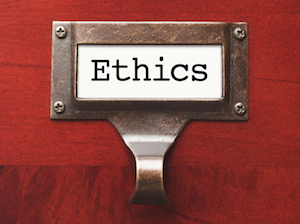Data Ethics describe a code of behavior, specifically what is right and wrong, encompassing the following:
- Data Handling: generation, recording, curation, processing, dissemination, sharing, and use.
- Algorithms: AI, artificial agents, machine learning, and robots.
- Corresponding Practices: responsible innovation, programming, hacking, and professional codes.
Data Ethics build on the foundation provided by computer and information ethics, but at the same time, they refine the approach endorsed so far in this research field by shifting the level of abstraction of ethical enquiries from being information-centric to being data-centric. For example, Data Ethics focus on third-party practices with individuals’ data, while information ethics span more broadly to media, journalism, and library and information science.
Data ethical misdeeds such as the leaks from Edward Snowden and the manipulation of Facebook data to influence the U.S. presidential election are encouraging legal actions. National and international governments draft, publish, and enforce Data Ethics rules. Some examples include the European Union’s General Data Protection Regulation (GDPR), the Health Insurance Portability and Accountability Act (HIPAA), and the Family Educational Rights and Privacy Act (FERPA). In addition, individual states, regions, and provinces are also developing more expansive regulations around Data Ethics (e.g., the California Consumer Privacy Act).
Although organizations do not have the same jurisdiction as a government, various groups are coming together to provide sets of guidelines. For example, Bloomberg, BrightHive, and Data for Democracy are developing a code of Data Ethics called Community Principles on Ethical Data Sharing (CPEDS) to codify Data Ethics for Data Scientists.
At a local or corporate level, both Data Governance and legal counsel are responsible for overseeing compliance of and remediation for breaches in Data Ethics rules.
Other Definitions of Data Ethics Include:
- “Data mindfulness” guiding the ethical use of data within all organizations. (Kathy Rondon)
- “A specialized area of Data Governance and Stewardship” where data can be “productionalized and, in large part, automated through the use of good tooling.” (Tech Crunch)
- Not only moral guidance as to “what data should be collected and how it should be used,” but also “who gets to make those decisions in the first place.” (Phys.org)
- A code of conduct or ethics for Data Scientists, similar to the purpose of the Hippocratic Oath in guiding medical professionals. (BrightHive)
- Code guiding Data Scientists’ behaviors, to “better human society.” (Forbes)
Businesses are Interested in Using Data Ethics to:
- Comply with regulations.
- Prove themselves trustworthy.
- Ensure fair and reasonable data usage.
- Minimize biases and social inequities.
- Develop a positive public perception.
Image used under license from Shutterstock.com
